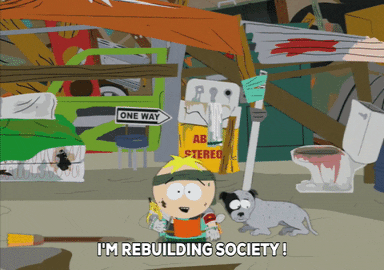|
Upon reading black rednecks and white liberals, and reflecting on the past 4 years of American existence on Independence day, I have started to find signal in my thoughts pointing to some key rules that explain how society works and why it feels so uncomfortable when things are going differently. The world has too much information to be centrally governed For most governing decisions that immediately impact our lives, there is simply too much information to consider and too many variable for these decisions to be made “at the top”. The more localised government decisions are, the more likely they are to be representative of those that are effected and good overall decisions. Everyone is tribal Those that ignore this, do so at their own peril. As humans we are naturally tribal. As an extension of Dunbar’s number from Malcom Gladwell’s Tipping Point, it can be hygienic to think that everyone in a country can be homogenous or that they can simply be forced into homogeneity. Whilst that would sure make things awfully simple, it is just not true. South vs North, Mercantiles vs Entrepreneurs, Bankers vs artists, never progressing workers vs stuck Middle management, Vegan vs Paleo. For evolutionary reasons we split into tribes. The key to using this rule is to realise that tribes remain fairly small. Saying poor vs rich is overall poor mental modelling. Races don’t war against each other, it is in fact the tribes within them that create friction between their differences. Every country will have a civil war at some point Usually by ignoring the first 2 rules, every developed country will experience a civil war. When one tribe tries to govern over the others with imposing, central governance this leads to war. The only way to survive a ruling class is with localised power Do you ever stop to think about the term “the ruling class” - for hundreds of years people have rallied against the “elites” or "ruling class”. As so long as there is centralised power, there will always be a ruling class. It is not a real goal of progress to remove a ruling class, but only to take power back from them down to a local level. Whilst often blamed for all manner of decisions that the half who lost didn’t like, the issue of states rights and the way in which America’s federated states can make localised decisions that are not enforced on other states has frequently blocked the rise of a ruling class in the US. That is - other than the career politician who is great at writing long laws but lacks understanding of finance, engineering and problem solving. Different cultures need to assimilate on the core principles to remain peaceful Overall societies that operate across a country, do so based on principles and the way in which different cultures remain peaceful and in harmony is by assimilating on these principles. There is repeatedly a question of clashing cultures in countries with mass immigration such as the US and the UK and I believe that such a discussion is a waste of energy. When we can align on principles everything else falls by the wayside. Principles are often unspoken, in the US you can argue that most of the principles are written in the constitution. For over a decade I have spoken of principles amongst friends and colleagues, for many they are an idea too far removed from application to fully grasp. If you want to discuss further - reach out! America is probably positioned best to survive the next 100 years If you turn off the news in the US, (no exceptions) what you will see is an incediblly diverse and unified country. No I’m not crazy, for a brief moment in time we look and feel divided on politics but what this is, is a temporary forgetfulness of our principles and brainwashing by major news networks.
In other parts of the developed world, politics is not discussed but there are clearly factions of society that are looking for violent revolution. The fact that politics are not openly discussed probably contributes to the powder keg that is developing there. When I ambiguously make this point, I make it with 2 nations in mind, Germany and the UK. Both are facing internal struggles that are rarely discussed, and going through unspoken and creeping reform which silences discussion and descent, removes the protection of free speech and centralises local power and decision making. In the next 100 years we face mass automation, sudden unemployment, environmental change, mass surveilance and a whole host of things we can’t imagine yet. A country bound by a shared set of principles, protected by law, divided by governance is most likely to come out on top. Whilst full of faults and perennially improving I think the future is bright for this nation.
1 Comment
|
Archives
June 2024
Categories
All
|

 RSS Feed
RSS Feed